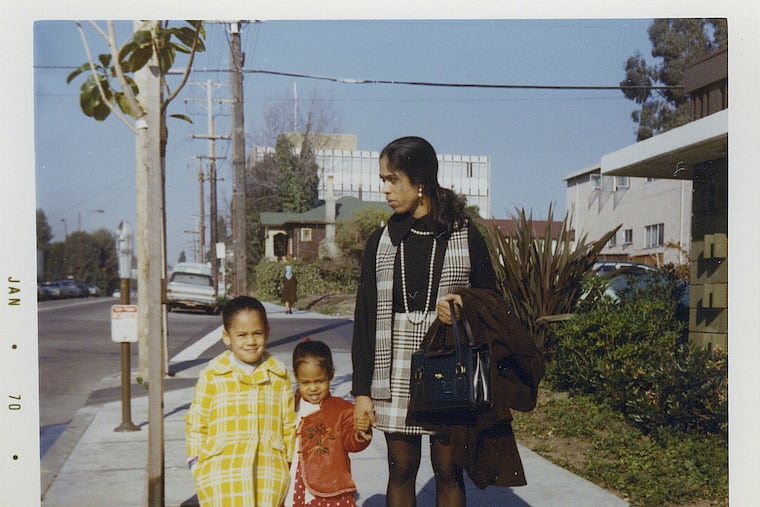Kamala Harris’ story is a reminder that immigrants and their families always have something to prove | Opinion
As an immigrant, I could feel the weight of Harris’ mother’s story and sacrifice on her shoulders — and the pressure we feel to make our sacrifices "worth it."

Listening to Sen. Kamala Harris accept the Democratic nomination for vice president of the United States, I immediately thought of Matt Damon — and a unique psychological burden for immigrants.
On the third night of the all-virtual Democratic National Convention, Harris delivered a speech from Wilmington. She introduced herself to the American people: a daughter of an immigrant from India and an immigrant from Jamaica rising to be the first Black and first South Asian woman on a major party ticket. She spoke about her late mother, Shyamala Gopalan Harris, and the strength she derived from her.
Harris said: “I keep thinking about that 25-year-old Indian woman, all of five feet tall, who gave birth to me at Kaiser hospital in Oakland, Calif. On that day, she probably could have never imagined that I would be standing before you now and speaking these words: I accept your nomination for vice president of the United States of America.”
As an immigrant, I could feel the weight of Harris’ mother’s story and sacrifice on her shoulders. It is also when I thought about Damon and his surprising role in helping me define what so often keeps me up at night.
In the last minutes of the Steven Spielberg World War II movie Saving Private Ryan, Tom Hanks’ character — who led a group of soldiers, most of whom died, across France to retrieve Pvt. Ryan, portrayed by Damon — tells the private to live a life that will make it all worth it. In the final scene, an old Pvt. Ryan visits Hanks’ character’s grave with his family. He asks his wife: “Tell me I’ve led a good life.”
Pvt. Ryan walked around for decades with a burden especially familiar to immigrants and children of immigrants — living a life that proves great sacrifice was worth it.
For many immigrants, that sacrifice comes in the form of separating from family, risking deportation, and being disconnected from culture and language. For many of their children, the sacrifice could mean adult parents living in a strange land, not knowing the language, and feeling culturally adrift.
As an extremely privileged immigrant — white, documented, from a country the president doesn’t consider a “s—hole,” and with means — the sacrifice of my story is not as dramatic and with much less risk. Still, I carry it daily.
» READ MORE: Learn to say Kamala Harris’ name, and mine, too | Opinion
Ever since I moved to the United States from Israel, every inch of the Atlantic Ocean between me and my family has been constantly present. The distance became somehow even larger after my daughter Mara was born two and a half years ago. Living so far away from my family, particularly my 106-year-old grandmother, parents, brother and sister, and niece and nephew, deprived Mara of consistent interaction with them, and them from reveling in Mara’s growth. It feels like a sacrifice I alone decided that people I love must take.
The distance again became even larger with the coronavirus pandemic. We had to cancel an April trip to Israel, and both times we rescheduled it since. I don’t know when next Mara and my family will be together — and I’m extremely aware of the impact that has on them, on her, and on me.
The way to cope with the distance is to assess my life for being “worth it.” If my wife and I excel in our careers, if Mara is a happy and healthy child, then we can rationalize the sacrifice. Any achievement, anything that feels extraordinary — something that might not have happened had I stayed in Israel — becomes a data point to justify the pain that comes with the desire to just be together. Any period of depression and dissatisfaction represents a failure to live up to the promise of immigration — mainly when each one immigration story impacts the lives of so many.
Adding to the pressure is America’s obsession with exceptional immigration stories — often told through racist “model minority” or “escape” from so-called “third world” framing. Stories of immigrants who achieved the extraordinary get held up as a baseline. In his acceptance speech, Joe Biden said “Harris’ story is the American story.” But just like the vast majority of children of nonimmigrant families, most of us will not hold powerful elected office.
» READ MORE: Kamala Harris applauds Biden’s ‘audacity to choose a Black woman to be his running mate’
Immigrants and children of immigrants don’t get to just be. We always have something to prove, to ourselves and others — that it was worth leaving home, and that we seized every possible opportunity that comes with living in the United States. In what is overall an ordinary life, it’s hard to imagine an achievement that will be big enough to settle the score.
Listening to Harris tie her acceptance to her mother’s immigration story, I couldn’t help think of all the nights fellow immigrants and children of immigrants wondered if they would ever be able to definitively say that their sacrifice, or, more importantly, our family’s sacrifice for us, was, in fact, worth it.
There is no one moment that can lift a complex emotional burden completely, though being nominated as the next vice president of the United States is probably as close as it gets. Most immigrants and children of immigrants will never get that moment — but it doesn’t make our immigration story any less worthy.